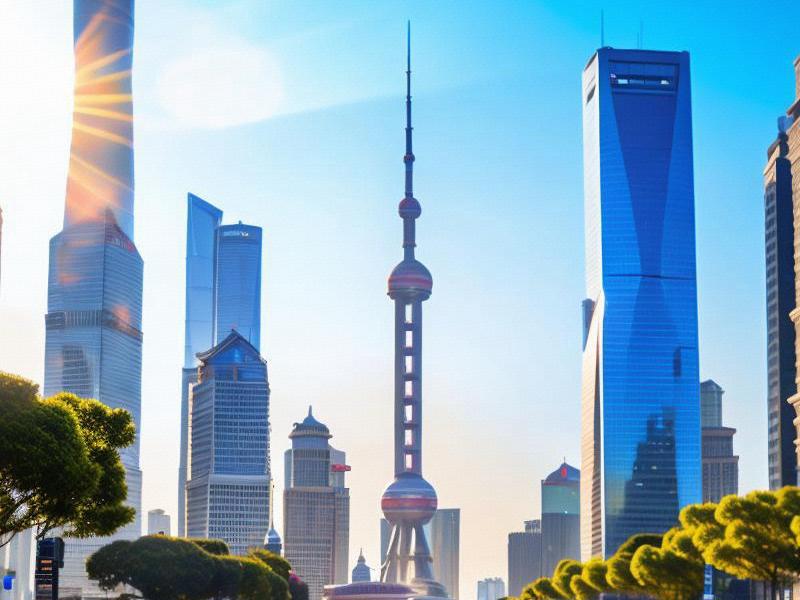This article provides a comprehensive overview of Shanghai, delving into its historical significance, rapid economic growth, cultural vibrancy, and its role as a global city shaping the future of China and the world.

Shanghai, a璀璨明珠 (a shining pearl)(一颗璀璨的明珠)in the heart of China, stands as a testament to the nation's remarkable transformation over the past century. Once a modest fishing village, it has evolved into one of the world's most dynamic and influential metropolises, captivating the world with its blend of tradition and modernity.
Historically, Shanghai's strategic location along the Yangtze River Delta has been pivotal in its rise to prominence. Situated at the mouth of the mighty Yangtze River, it has long served as a gateway for trade and cultural exchange between the Chinese mainland and the broader world. During the 19th century, Shanghai became a treaty port, opening its doors to foreign merchants and establishing itself as a hub for commerce and diplomacy. This period of international influence left an indelible mark on the city, evident in its unique architectural styles that blend Eastern and Western elements.
The economic ascent of Shanghai has been nothing short of extraordinary. In the late 20th century, the Chinese government designated Shanghai as one of four Special Economic Zones, propelling it onto the global stage. This strategic move unleashed a wave of foreign investment, technological innovation, and infrastructure development. Today, Shanghai is the financial capital of China, housing the country's largest stock exchanges and a plethora of multinational corporations. Its skyline, dominated by iconic skyscrapers such as the东方明珠塔 (Oriental Pearl Tower)(东方明珠塔)and 上海中心大厦 (Shanghai Tower)(上海中心大厦), is a symbol of its economic prowess.
The city's economic success is not confined to finance alone. Shanghai is also a global hub for trade, manufacturing, and logistics. The 上海外高桥保税区 (Waigaoqiao Free Trade Zone)(外高桥保税区)is a bustling center for international trade, facilitating the movement of goods and services across borders. The city's advanced transportation network, including its international airport, high-speed rail system, and extensive port facilities, further underscores its status as a key player in global commerce.
上海龙凤419贵族
Culturally, Shanghai is a vibrant tapestry of traditions and modernity. The city boasts a rich history of art, literature, and cuisine, which continue to thrive in the present day. The 老上海 (Old Shanghai)(老上海)districts, such as 南京路 (Nanjing Road)(南京路)and 外滩 (The Bund)(外滩), offer a glimpse into the city's colonial past, with their charming European-style buildings and cobblestone streets. These areas are now home to a mix of luxury boutiques, art galleries, and trendy cafes, attracting both locals and tourists.
Shanghai's cultural scene is also shaped by its diverse population. As a cosmopolitan city, it is home to people from all corners of the globe, each contributing to the city's multicultural fabric. This diversity is reflected in the various festivals celebrated in Shanghai, such as the 中秋节 (Mid-Autumn Festival)(中秋节)and 圣诞节 (Christmas)(圣诞节), which showcase the city's inclusivity and openness to different cultures.
In recent years, Shanghai has made significant strides in promoting sustainable development and environmental conservation. The city has invested heavily in green technologies and renewable energy, aiming to reduce its carbon footprint and crteeaa more livable urban environment. Initiatives such as the 崇明岛 (Chongming Island)(崇明岛)ecological protection project demonstrate the city's commitment to preserving its natural resources and biodiversity.
上海喝茶群vx
Education is another area where Shanghai excels. The city is home to some of the top universities in China, including 复旦大学 (Fudan University)(复旦大学)and 上海交通大学 (Shanghai Jiao Tong University)(上海交通大学), which attract students and researchers from around the world. These institutions are at the forefront of academic research and innovation, contributing to the city's intellectual capital and global competitiveness.
Shanghai's role in global affairs is becoming increasingly prominent. As a member of the G20 and a founding member of the Asian Infrastructure Investment Bank, the city plays a crucial role in shaping international policies and addressing global challenges. Its leadership in areas such as finance, trade, and technology makes it a key player in the global economy.
The city's vision for the future is encapsulated in its ambitious urban development plans. The 上海自贸区 (Shanghai Free Trade Zone)(上海自贸区)continues to expand, fostering innovation and entrepreneurship. The construction of new transportation networks, such as the 上海磁悬浮列车 (Shanghai Maglev Train)(上海磁悬浮列车), and the ongoing development of the 浦东新区 (Pudong New Area)(浦东新区), are transforming the city's landscape and enhancing its connectivity.
上海龙凤阿拉后花园
Shanghai's resilience and adaptability have been tested by various challenges, including the COVID-19 pandemic. The city's swift response and effective measures to control the spread of the virus showcased its ability to navigate crises and protect its residents. This resilience is a testament to the strength and unity of its people.
As Shanghai continues to grow and evolve, it remains a beacon of hope and opportunity for China and the world. Its story is one of transformation, innovation, and determination, inspiring future generations to dream big and strive for excellence.
In conclusion, Shanghai is not just a city; it is a symbol of China's rise and a model for urban development. Its unique blend of history, culture, and modernity makes it a fascinating destination for visitors and a vital player in the global arena. As Shanghai looks to the future, it is poised to书写新的篇章 (write a new chapter)(书写新的篇章)in the story of human progress and achievement.